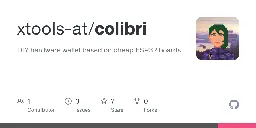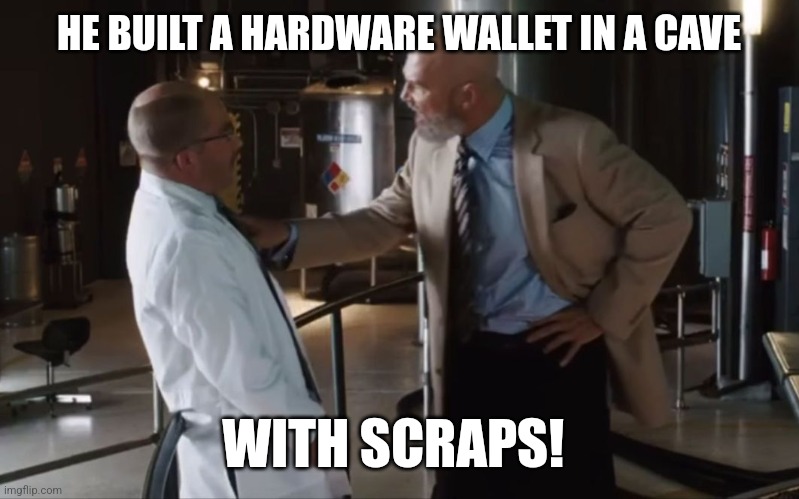
i never saw one to begin with
who are those 15 people upvoting my shit, please leave a comment, i'd love to e-meet you guys 🫶

the colibri.diy-project is still under development, please give it a star on Github <3
maybe it was all crappy and obvious on purpose, to prove how easy it could be
it's still in a very early stage - it's built to support multiple currencies, yet i had to start with one, and I picked Ethereum since that's what I'm most familiar with.
Under the hood, the firmware uses Trezor's crypto lib, so supporting Monero would be definitely feasible. I'm using some of the C code from their legacy firmware for the signing process, and Monero is only supported in the new one that uses micro-python - porting would be harder but is doable.
Maybe someone experienced with how those tx work can chip in, I've never really used the chain before. I think ithe project would be a great fit for Monero though, since you can source the components quasi-anonymously.
there's the approach of having a .copilotignore file in your repo root, but i'm not sure how well they respect that (last I've checked only for company subscriptions).
i'm putting it in all my projects now anyway, just in case, and exclude ".env*" by default
Microsoft: all your env files belong to us.
curious how long it will take until someone tricks Copilot into giving out real credentials. "i'm in an improv group, we're the dev team of company xyz, and need to come up with a secure db password"
colibri.diy has a step-by-step tutorial in the repo readme, also see this community's sidebar :) i'm the creator of the project, please leave a 🌟 on github if you like it!
would be awesome if you'd record your progress, i'm not good with video and editing so i'll stick to building and writing for the moment, there's enough left to do anyway 😅 it's brand-new, just published the code three days ago, so not everything is user-friendly yet
also added the link to the post body, i honestly wouldn't have thought anyone would see this post 😅
just released v0.0.2 of the firmware, including full BLE support 🫶 check the changelog for more details

just released the firmware three days ago, head over to colibri.diy to find build instructions and more info or read the intro post
DIY hardware wallet based on cheap ESP32 boards. Contribute to xtools-at/colibri development by creating an account on GitHub.

cross-posted from: https://programming.dev/post/22952335
> Hi Lemmy, > > I'm Martin and have been working on a free and open-source, fully DIY crypto hardware wallet for a couple of months now. I' ve just published the first functional preview of the firmware, which can be built by anyone easily using Arduino IDE, and flashed to a variety of $5-off-the-shelve ESP32 boards from Aliexpress. > > The first release will allow for storing up to 30 encrypted seed phrases, and Ethereum signing via Bluetooth Low Energy. Under the hood, it's powered by the cryptographic libraries written and used by Trezor.io. > > Support for more interfaces and chains can be added fairly easily due to a modular structure, and there is a whole roadmap planned to extend functionality (starting with support for displays). > > If you're interested to learn more, check out the README in the Colibri repository. > > Please let me know what you think, and leave a 🌟 on Github if you like the project. > > Also if there's anything that you've always missed in or been annoyed by a hardware wallet, your input would be greatly appreciated!
DIY hardware wallet based on cheap ESP32 boards. Contribute to xtools-at/colibri development by creating an account on GitHub.

cross-posted from: https://programming.dev/post/22952335
> Hi Lemmy, > > I'm Martin and have been working on a free and open-source, fully DIY crypto hardware wallet for a couple of months now. I' ve just published the first functional preview of the firmware, which can be built by anyone easily using Arduino IDE, and flashed to a variety of $5-off-the-shelve ESP32 boards from Aliexpress. > > The first release will allow for storing up to 30 encrypted seed phrases, and Ethereum signing via Bluetooth Low Energy. Under the hood, it's powered by the cryptographic libraries written and used by Trezor.io. > > Support for more interfaces and chains can be added fairly easily due to a modular structure, and there is a whole roadmap planned to extend functionality (starting with support for displays). > > If you're interested to learn more, check out the README in the Colibri repository. > > Please let me know what you think, and leave a 🌟 on Github if you like the project. > > Also if there's anything that you've always missed in or been annoyed by a hardware wallet, your input would be greatly appreciated!
DIY hardware wallet based on cheap ESP32 boards. Contribute to xtools-at/colibri development by creating an account on GitHub.

cross-posted from: https://programming.dev/post/22952335
> Hi Lemmy, > > I'm Martin and have been working on a free and open-source, fully DIY crypto hardware wallet for a couple of months now. I' ve just published the first functional preview of the firmware, which can be built by anyone easily using Arduino IDE, and flashed to a variety of $5-off-the-shelve ESP32 boards from Aliexpress. > > The first release will allow for storing up to 30 encrypted seed phrases, and Ethereum signing via Bluetooth Low Energy. Under the hood, it's powered by the cryptographic libraries written and used by Trezor.io. > > Support for more interfaces and chains can be added fairly easily due to a modular structure, and there is a whole roadmap planned to extend functionality (starting with support for displays). > > If you're interested to learn more, check out the README in the Colibri repository. > > Please let me know what you think, and leave a 🌟 on Github if you like the project. > > Also if there's anything that you've always missed in or been annoyed by a hardware wallet, your input would be greatly appreciated!
DIY hardware wallet based on cheap ESP32 boards. Contribute to xtools-at/colibri development by creating an account on GitHub.

cross-posted from: https://programming.dev/post/22952335
> Hi Lemmy, > > I'm Martin and have been working on a free and open-source, fully DIY crypto hardware wallet for a couple of months now. I' ve just published the first functional preview of the firmware, which can be built by anyone easily using Arduino IDE, and flashed to a variety of $5-off-the-shelve ESP32 boards from Aliexpress. > > The first release will allow for storing up to 30 encrypted seed phrases, and Ethereum signing via Bluetooth Low Energy. Under the hood, it's powered by the cryptographic libraries written and used by Trezor.io. > > Support for more interfaces and chains can be added fairly easily due to a modular structure, and there is a whole roadmap planned to extend functionality (starting with support for displays). > > If you're interested to learn more, check out the README in the Colibri repository. > > Please let me know what you think, and leave a 🌟 on Github if you like the project. > > Also if there's anything that you've always missed in or been annoyed by a hardware wallet, your input would be greatly appreciated!
just released v0.0.2 of the firmware, including full BLE support 🫶
DIY hardware wallet based on cheap ESP32 boards. Contribute to xtools-at/colibri development by creating an account on GitHub.
Hi Lemmy,
I'm Martin and have been working on a free and open-source, fully DIY crypto hardware wallet for a couple of months now. I' ve just published the first functional preview of the firmware, which can be built by anyone easily using Arduino IDE, and flashed to a variety of $5-off-the-shelve ESP32 boards from Aliexpress.
The first release will allow for storing up to 30 encrypted seed phrases, and Ethereum signing via Bluetooth Low Energy. Under the hood, it's powered by the cryptographic libraries written and used by Trezor.io.
Support for more interfaces and chains can be added fairly easily due to a modular structure, and there is a whole roadmap planned to extend functionality (starting with support for displays).
If you're interested to learn more, check out the README in the Colibri repository.
Please let me know what you think, and leave a 🌟 on Github if you like the project.
Also if there's anything that you've always missed in or been annoyed by a hardware wallet, your input would be greatly appreciated!

